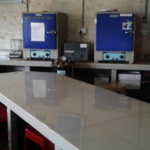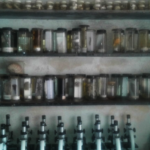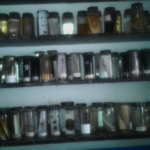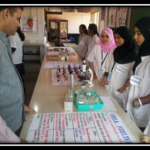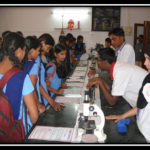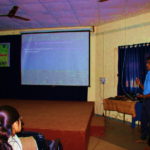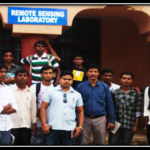- Zoology Department is one of the leading department of the institution that offers UG, PG, certificate and Ph.D. courses.
- This department is well known for consistently good results in the University examinations, participation in Avishkar research conventions, organization of field visits.
- Department expose students to various fields in Zoology and provides basic as well as advanced concepts in the Zoology at UG and PG level students for pursuing higher studies in Zoology.
- It also enable students to get employed in the Biological research Institutes, Industries, Educational Institutes and in the range of concerning departments based on subject Zoology.
- It transform our traditional closed classroom teaching learning practices to more of field and activity based studies, the correct methodology for the study of Natural Sciences.
- Department orient the students about ecosystem, bio-diversity, wildlife conservation and management with the help of models, photographs, movies, documentaries, charts and use of ICT and then take learners to field to have realistic experiences.
- Department creating awareness about different types of issues and also to make best use of the knowledge in their own interest as well as for the country.
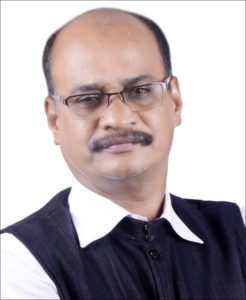
Dr. Sandesh Jagdale
Principal
M.Sc., Ph.D.
Zoology

Dr. Rajendra Sadashiv Sunita More
Head, Department of Zoology
M.Sc., M.Phil., Ph.D.
Marine Zoology, Fishery Biology
Year of Joining 1997
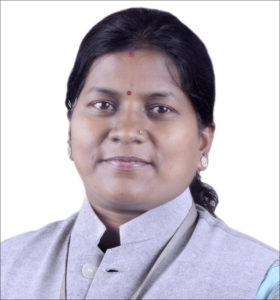
Prof. Mrs. Jagtap Nanda Bhupal
Assistant Professor
M.Sc., M.Phil., B.Ed.
Physiology, Fishery Biology
Year of Joining 2009

Prof. Mr. Temkar Sujit Ramesh
Assistant Professor
M.Sc.,
Oceanography and Fishery Science
Year of Joining 2016
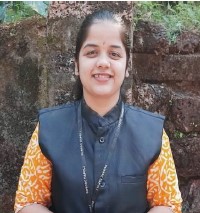
Prof. Miss. Swati M. Depolkar
Assistant Professor
M.Sc.
Year of Joining 2019

Prof. Miss. Juweria. A. Arai
Assistant Professor
M.Sc. (Zoology)
Year of Joining 2022
| Semester | Course | Course Code | Weightage | Credits | Syllabus |
| I | Zoology | USZO 101 | 100 | 02 | Download |
| Zoology | USZO 102 | 100 | 02 | ||
| Zoology practical | USZOP1 | 100 | 02 | ||
| II | Zoology | USZO 201 | 100 | 02 | |
| Zoology | USZO 202 | 100 | 02 | ||
| Zoology practical | USZOP2 | 100 | 02 | ||
| III | Zoology | USZO 301 | 100 | 02 | Download |
| Zoology | USZO 302 | 100 | 02 | ||
| Zoology practical | USZOP3 | 100 | 03 | ||
| IV | Zoology | USZO 401 | 100 | 02 | |
| Zoology | USZO 402 | 100 | 2.5 | ||
| Zoology practical | USZOP4 | 100 | 03 | ||
| V | Zoology | USZO 501 | 100 | 2.5 | Download |
| Zoology | USZO 502 | 100 | 2.5 | ||
| Zoology practical | USZOP5 | 100 | 03 | ||
| VI | Zoology | USZO 601 | 100 | 2.5 | |
| Zoology | USZO 602 | 100 | 02 | ||
| Zoology practical | USZOP6 | 100 | 03 |
| Semester | Course | Course Code | Weightage | Credits | Syllabus |
| I | Zoology | PSZO101 | 100 | 4 | Download |
| Zoology | PSZO102 | 100 | 4 | ||
| Zoology | PSZO103 | 100 | 4 | ||
| Zoology | PSZO104 | 100 | 4 | ||
| Zoology | PSZOP101 | 50 | 2 | ||
| Zoology | PSZOP102 | 50 | 2 | ||
| Zoology | PSZOP103 | 50 | 2 | ||
| Zoology | PSZOP104 | 50 | 2 | ||
| II | Zoology | PSZO201 | 100 | 4 | |
| Zoology | PSZO202 | 100 | 4 | ||
| Zoology | PSZO203 | 100 | 4 | ||
| Zoology | PSZO204 | 100 | 4 | ||
| Zoology | PSZOP201 | 50 | 2 | ||
| Zoology | PSZOP202 | 50 | 2 | ||
| Zoology | PSZOP203 | 50 | 2 | ||
| Zoology | PSZOP204 | 50 | 2 | ||
| III | Zoology | PSZO301 | 100 | 4 | Download |
| Zoology | PSZO302 | 100 | 4 | ||
| Zoology | PSZO303 | 100 | 4 | ||
| Zoology | PSZO304 | 100 | 4 | ||
| Zoology | PSZOP301 | 50 | 2 | ||
| Zoology | PSZOP302 | 50 | 2 | ||
| Zoology | PSZOP303 | 50 | 2 | ||
| Zoology | PSZOP304 | 50 | 2 | ||
| IV | Zoology | PSZO401 | 100 | 4 | |
| Zoology | PSZO402 | 100 | 4 | ||
| Zoology | PSZO401 | 100 | 4 | ||
| Zoology | PSZO402 | 100 | 4 | ||
| Zoology | PSZOP401 | 50 | 2 | ||
| Zoology | PSZOP402 | 50 | 2 | ||
| Zoology | PSZOP403 | 50 | 2 | ||
| Zoology | PSZOP404 | 50 | 2 |
Fishery Syllabus
PO
B.Sc.
PO1. CRITICALTHINKING
The curriculum is designed in such way that students should acquire an ability to observe accurately and objectively. They should be able to solve the problems and also think scientifically, independently and draw rational conclusions.
PO2. SCIENCE COMMUNICATION
Curriculum empowers communication skills in science which further enhances easy spread of scientific knowledge in the society.
PO3 SOCIAL INTERACTIONS
Students acquire national integration, community harmony, gender equality and nationalism which inculcate harmonized social interaction. Made aware of environment related issues.
PO4 EFFECTIVE CITIZENSHIP
Students acquire attributes of good citizens with certain ethics, made aware of environmental issues its management and planning.
PO5 ALLROUND PERSONALITY
Students develop as all-round individuals possessing variety of values and skills conferred by extracurricular activities.
M.Sc.
PO1. CRITICALTHINKING
The curriculum is designed in such way that students should acquire an ability to observe accurately and objectively. They should be able to solve the problems and also think scientifically, independently and draw rational conclusions.
PO2. SCIENCE COMMUNICATION
Curriculum empowers communication skills in science which further enhances easy spread of scientific knowledge in the society.
PO3 SOCIAL INTERACTIONS
Students acquire national integration, community harmony, gender equality and nationalism which inculcate harmonized social interaction.
PO4 EFFECTIVE CITIZENSHIP
Students acquire attributes of good citizens with certain ethics, made aware of environmental issues its management and planning.
PO5 ALLROUND PERSONALITY
Students develop as all-round individuals possessing variety of values and skills conferred by extracurricular activities.
PO6
Integration of convergent and divergent thinking ability, which makes the students to differentiate between myth and realities and enable to develop new solutions for problems
PO7
Students acquaint with research attitude and able to find out research problems. They understand global, environmental and ethical issues by interdisciplinary kind of research
PO8
Students instill baseline thinking required for employment and entrepreneurship.
PO9
Students acquire skills in handling scientific instruments, planning and performing scientific experiments.
PhD
PO1
Student gets ability of critical thinking and develops competence required in the field of research
PO2
Develop skill of scientific communication.
PO3
Understand the ethical aspects of research.
PO4
Students can understand scientific research methodology
PO5
They develop soft skills required to perform, write and present research topics for the research degree
PO6
Develops quality such as critical thinking and analysis
PO7
Students get ability to find out the research problem, their solutions and conclude the results in both fundamental and applied science
PSOs
- Learners would work safely in the laboratory and avoid occurrence of accidents (mishaps) which will boost their scholastic performance and economy in use of materials/chemicals during practical sessions.
- Students will be skilled to select and operate suitable instruments.
- Learners would be inspired to choose career options in the field of wild life conservation, research, photography, Fishery industry and ecotourism.
- Learner will understand the science of vermicomposting and dairy in respect to entrepreneurship.
- Learner will appreciate and respect domestic pets through proper care.
COs:
- Curiosity will be ignited in the mind of learners, to know more about the fascinating world of animals which would enhance their interest and love for the subject of Zoology.
- Learners would understand recent advances in the subject and their applications for the betterment of mankind; and that the young minds would be tuned to think out of the box.
- Learners will study the nature of animal population, specific factors affecting its growth and its impact on the population of other life form.
- Learners will grasp the concept of interdependence and interaction of physical, chemical and biological factors in the environment and will lead to better understanding about implications of loss of fauna specifically on human being, erupting spur of desire for conservation of all flora and fauna.
- Healthy dietary habits would be inculcated in the life style of learners in order to prevent risk of developing health hazards in younger generation.
- Promoting optimum conservation of water, encouragement for maintaining adequate personal hygiene, optimum use of electronic gadgets, avoiding addiction, thus facilitating achievement of the goal of healthy young India.
- Learners will be able to promptly recognize stress related problems and would be able to acquire knowledge of cause, symptoms and precautions of infectious diseases.
- Lerner will understand the principles of inheritance, Units of inheritance and mechanisms of sex determination, genetic disorders, importance of nucleic acids as genetic material.
- The learners would understand and appreciate the regulation of gene expressions.
- Learners would understand the increasing complexity of nutritional, excretory and osmoregulatory physiology in evolutionary hierarchy.
- Learners would understand the increasing complexity of respiratory and circulatory structures and physiology in evolutionary hierarchy.
- Learners would understand the process of control and coordination by nervous and endocrine regulation.
- Learners would be fascinated by various locomotory structures found in the animal kingdom.
- Learners would be acquainted with various reproductive strategies present in animals including man.
- Learners would gain an insight into different types of animal behavior and their role in adaptation.
- Learners will become familiar with advances in ART and related ethical issues.
- The learner will develop qualities such as critical thinking, analysis and scientific communication and will understand the ethical aspects of research.
- Learner would acquire insight of transport mechanisms for the maintenance and composition of cell, the intricacy of endomembrane system and the interlinking of endomembrane system for functioning of cell.
- The learner will realize the importance of biomolecules and their clinical significance.
- Learners will apply the knowledge to adopt a healthy life style.
- The learner will become cognizant about genetic and neurological disorders as well as genetic counseling, its requisites and significance.
- Learner will be able to relate various anthropogenic activities with environmental degradation and its harmful effects on human health and will become more sensitive towards the environmental issues.
- 3 separate laboratories for UG and PG courses.
- PG laboratory with ICT facility.
- Separate Staff room.
- Computer and Printing facility with Internet connection
- Rich Museum with shell, bivalves, marine and freshwater fish.
- Department has Trinocular Research microscope, LCD microscope, Centrifuge machine, Incubator, Oven, Colorimeters, PH meters, Digital balance etc.
| Name of the Teacher | Year | Title of the Project | Funding agency | Amount sanctioned |
| Dr. Rajendra S. More | 2013 | Diversity of mangrove clams along the Dapoli Coast. | Mumbai University | 20000/- |
| Dr. Rajendra S. More | 2015 | Diversity and Nutritional Analysis of mangrove Clam –Geloina proxima (Prime,1864) of Dapoli Coast of Ratnagiri District | UGC | 3.50 Lakh |
| Prof. Mrs. Nanda B. Jagtap | 2014 | “Biodiversity of Crabs At Harnai Port Dapoli Ratnagiri.” | Mumbai University | 25.000/- |
| Prof. Mrs. Nanda B. Jagtap. | 2015 | Utilization of weeds cassia tora and wild colocasia esculantum to generate biofertilizer using an earthworm, Eisenia fetida | Mumbai University | 26,000/- |
| Sr. No. | Name of Visiting Faculty | College |
| 1. | Dr. Vikrant Berde | Arts and Science College, Lanja-Ratnagiri |
| 2. | Dr. Mrs. Chanda Berde | Gogate Jogalekar College, Ratnagiri |
| 3. | Dr. Ayub Sheikh | I.C.S. College, Khed-Ratnagiri |
| 4. | Dr. Sharad Mahajan | K.V. Pendharkar College, Dombivali-District-Thane |
| 5. | Dr. Shashibhal Pandye | RKT College, Ulhasnagar-District-Thane |
| 6. | Prof. Sarwat Parkar | Wilson college, Church gate Mumbai |
| 7. | Dr. Varsha Andhare | Institute of Science, Mumbai |
| 8. | Dr. Supriya Deshmukh | M.D. College, Parel, Mumbai |
| 9. | Dr. Ganesh Margaj | S.P.K.College,Sawantwadi-District-Sindhudurga |
| 10. | Dr. Mansi Phanase | K.V. Pendharkar College, Dombivali-District-Thane |
| 11. | Dr. Mrs. Nirmala Pawar | L.G.M. College, Mandangad. |
| Class | Year | Student Appeared | Student Passed | % Result | Grade | |||
| T.Y.B.Sc. | 2012 | 07 | 05 | 71.42 | O | A | B | C |
| 2013 | 08 | 04 | 50 | – | – | – | – | |
| 2014 | 13 | 13 | 100 | 10 | 03 | |||
| 2015 | 08 | 08 | 100 | 04 | 04 | |||
| 2016 | 16 | 14 | 87.5 | 08 | 05 | 01 | ||
| 2017 | 16 | 14 | 87.5 | 06 | 06 | 02 | ||
| M.Sc. | 2012 | – | – | – | – | – | – | |
| 2013 | – | – | – | – | – | – | ||
| 2014 | 08 | 07 | 87.5 | 03 | 04 | |||
| 2015 | 05 | 04 | 80 | 04 | ||||
| 2016 | 04 | 03 | 75 | 02 | 01 | |||
| 2017 | 06 | 04 | 66.66 | 02 | 02 | |||
Establishment of Butterfly garden
- Department has started ‘Zoo – Mi – Amhi’ wall poster activity on 10th August 2015.
- Demonstration of experiments to the students participated in the INSPIRE camp organized by the college.
- Department has prepared video show titled “ Tribute to Dr. Salim Ali – Diversity of Birds of Dapoli” and presented in nearby schools.
- Arrangement of exhibits in Vidnyan Jagar
- Conduct of bridge lectures
- Remedial coaching for slow learners.
- Organizations of field visits and excursions.
- Conduct of extra lectures for T.Y. B.Sc. Class.
- Conduct of Unit tests.
- Presence of Parent -Teacher system.
- Departmental Library:
- Total 82 books are available in the library.
- Special collection-
- Field guide to marine biologist by Dipak Apate
- Text book of Medical laboratory Pathology by Prafulla Godka
- Consultancy: –
- Linkages:
- MOU with ICS College Khed, District: Ratnagiri.
- MOU with K.V. Pendharkar College, Dombivali, District-Thane
- Active participation of students and teachers in workshops ,seminars and conferences and presentation of research papers.


